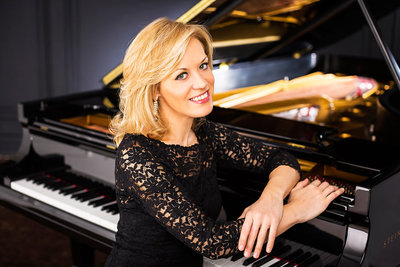
The New Year opens with a series of ace instrumentalists strutting their chops around town. At 4 pm Sunday, Jan. 3, First United Methodist Church (13th and Olive) brings a renowned instrumentalist, uilleann piper Eliot Grasso, to its annual handbell concert. That unusual ensemble is alone worth seeing, but this year’s show also features trumpeter Chris Peters and the church’s own organist, Julia Brown, an accomplished recording artist. Grasso is one of the acknowledged masters of the haunting Irish bagpipes and has performed all over the world.
At 7:30 pm Wednesday, Jan. 6, at the University of Oregon’s Beall Concert Hall, the UO unleashes its own fabulous flute virtuosa, Molly Barth, who became a new music star as the original flutist in the incomparable ensemble eighth blackbird before taking a faculty position at the university. Her recital with Atlanta percussionist Stuart Gerber features a computer-assisted work by Eric Lyon and Italian modernist composer Luciano Berio’s brief, chirpy 1958 classic Sequenza I. The show also features the premiere of a new piece by another Italian composer, Luca Cori, whose Quodlibarth is, as the title (and main melodic sequence, the notes B-A-H) suggests, dedicated to its muse, Barth.
“My first idea for Thorn was to embed a single spike somewhere in the middle of a long, slow, quiet melody,” wrote Pulitzer-winning American composer David Lang about his 1993 solo flute composition. “I thought that the listener would then spend the first part of the piece in fear and the second part in shock [but] the spike turned out to be the most interesting part of the piece, and, ultimately, I couldn’t resist the temptation to add many, many more of them.”
Lang also wrote the little Lend/Lease that Barth will perform, along with short pieces by John Fonville (that imitate the sound of the bamboo flute) and Ricardo Zohn-Muldoon. Gerber will play Tapping the Furnace by Dorothy Hindman — a big, dramatic solo percussion piece (with vocals) inspired by the African-American laborers who worked the dangerous blast furnaces in the steel mills that fueled Birmingham, Alabama’s economy for a century — one of several recent works (by American composers like Missy Mazzoli, Michael Daugherty and Julia Wolfe’s 2015 Pulitzer winner) inspired by America’s industrial revolution.
Beall is also the place to hear one of today’s most prominent pianists, Olga Kern, who parlayed her gold medal from the famous Cliburn Competition into a major career, in a solo recital at 3 pm Sunday, Jan. 10. Kern will play three of Domenico Scarlatti’s sparkling little sonatas, Beethoven’s great Waldstein sonata, Schumann’s popular Children’s Scenes, Liszt’s supremely virtuosic fantasy based on scenes from Mozart’s Don Giovanni and a brand-new piece written for Kern by fellow Russian musician Boris Frenkshteyn that’s inspired by commonalities in the music of Grieg and Bartok.
If you want to know the history of the tools of the trade of great instrumentalists like these, check out January’s Saturday morning lecture series by UO music prof Marc Vanscheeuwijck titled “From Clavichord to Grand Piano (1500-1900),” which explores the development of keyboard, wind, brass, bowed and plucked instruments from the Middle Ages to the 20th century. He’s giving a free preview lecture 7 pm Tuesday, Jan. 5, at the UO’s Knight Library Browsing Room.
John Pizzarelli started out as an instrumental whiz, like his famous fellow jazz guitarist dad, Bucky. But like others (Harry Connick, Chris Thile, Diana Krall, his idol Nat Cole), he soon expanded his portfolio to charismatic frontman, becoming one of today’s most popular crooners of Great American Songbook standards as well as more recent pop hits, including his recent Paul McCartney covers album. Pizzarelli brings his quartet back to The Shedd for the seventh time at 7:30 pm Thursday, Jan. 7.